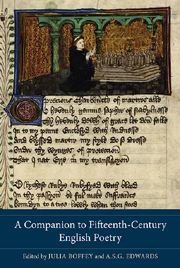Book contents
- Frontmatter
- Contents
- List of Contributors
- List of Abbreviations
- Conventions
- Introduction
- Part I Background and Context
- Part II Authors
- Part III Themes and Genres
- 11 Fifteenth-Century Chaucerian Visions
- 12 Historical and Political Verse
- 13 Classical and Humanist Translations
- 14 Romance
- 15 Scientific and Encyclopaedic Verse
- 16 Popular Verse Tales
- 17 Beyond the Fifteenth Century
- Chronology
- Index of Manuscripts
- General Index
15 - Scientific and Encyclopaedic Verse
from Part III - Themes and Genres
Published online by Cambridge University Press: 05 July 2013
- Frontmatter
- Contents
- List of Contributors
- List of Abbreviations
- Conventions
- Introduction
- Part I Background and Context
- Part II Authors
- Part III Themes and Genres
- 11 Fifteenth-Century Chaucerian Visions
- 12 Historical and Political Verse
- 13 Classical and Humanist Translations
- 14 Romance
- 15 Scientific and Encyclopaedic Verse
- 16 Popular Verse Tales
- 17 Beyond the Fifteenth Century
- Chronology
- Index of Manuscripts
- General Index
Summary
The fifteenth century witnessed two significant developments in the communication of information. The invention of print towards the end of the century may be the more prominent of the two. But a sudden, persistent and energetic demand for vernacular scientific texts, particularly in verse form, was no less significant. Indeed, this thirst for scientific information defined and changed the role of the written word in fifteenth-century England.
The genre of scientific and encyclopaedic poetry is more emblematic of the fifteenth century than prose texts or non-scientific verse in many respects. This is partly due to its various connections with classical literature. Thanks to the humanistic interest in classical works by Lucretius and Pliny, Manilius and pseudo-Aristotle, verse was considered a perfect medium for education and the transmission of knowledge, including scientific lore of supposedly ancient origin. The ensuing translation and imitation of classical texts typically took place in monasteries, around the development of university curricula, in royal courts and other centres of learning. With its natural emphasis on the sciences this scholarly, linguistic and exegetic engagement with classical literature had produced a vernacular scientific vocabulary from the fourteenth century onwards. The fifteenth-century translation of Gilbertus Anglicus’ pharmaceutical treatises is a prime example for the transposition of technical medical terms into Middle English prose (Healing and Society, ed. Getz 1991). Versified versions appear in compendia such as Longleat House, MS 174; this contains Gower's Confessio Amantis as well as Middle English medical verse (Harris 2001).
- Type
- Chapter
- Information
- A Companion to Fifteenth-Century English Poetry , pp. 199 - 212Publisher: Boydell & BrewerPrint publication year: 2013



